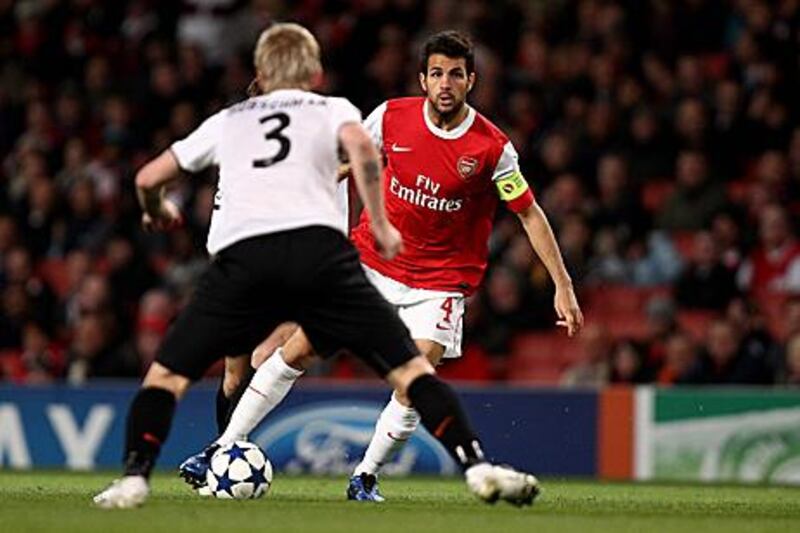Fending off predators has become a fatiguing habit for the elite of English football. Wayne Rooney threatened to leave Manchester United, and Fernando Torres would endanger his abductors in a sprint for the exit at Liverpool. Frank Lampard was priced out of a move to Inter Milan a couple of summers ago, while John Terry played a high stakes game of footsie with Manchester City the next.
There was a point near the end of last season when Cesc Fabregas thought Arsenal could be forced into succumbing to the will of a more powerful beast. The Catalan had decided to return to Barcelona, the club that formed him, and made Arsene Wenger aware of his intentions.
Fabregas hoped to make the divorce easier on both parties. By announcing his desire to leave early he sought to grant Arsenal the maximum time to replace him. The club where he had established his reputation could take the €35million (Dh179m) Barcelona considered "to be market value" at the beginning of June and reinvest as Wenger saw fit. Arsenal, however, appreciated neither the offer nor the timing.
Barca's money was rejected with an extraordinary statement in which the club said that Fabregas was contracted until the summer of 2015.
Extraordinary, because the last time Arsenal had announced a contract renewal with the player had been October 2006, and that an eight-year deal of questionable legality under Fifa transfer regulations.
Somewhere in between, Arsenal had taken the unusual step of improving Fabregas's terms without informing the general public, and, perhaps more relevantly, his teammates. Still in his early 20s, the midfielder's import to the club was such he had been secretly made their best-paid footballer.
Wenger sanctioned the pay rise as he sanctions every sale. While Patrick Vieira and Thierry Henry had been held through successive summers of overseas seductions until the manager deemed their contributions in decline, there was no question of Fabregas being physically on the wane.
The key calculation was whether the player would perform as before if prevented from returning to Barcelona.
As conscious as anyone in the gradual change of character that had preceded Fabregas's request to leave - off-field, a once effervescent personality had become surly and cautious - Wenger concluded that his captain would not intentionally lower on-field standards. "At the end of the day, I believe he wants to win with this club," said Wenger last week.
"For how long I don't know, but hopefully for many, many years. He deeply loves this club, believe me. If he did not love the club, he would have gone."
Though Fabregas expects to be allowed to move in eight months, the last sentence is accurate. It was through no dislike of Arsenal that the 23-year-old sought to switch to Barcelona, rather a frustration that in five seasons of establishing himself as one of the Premier League's most accomplished performers the club had not been strong enough to claim a single trophy.
His importance to Arsenal rectifying that record can be captured in statistic and sentence. Over this season and the last, Fabregas has begun 40 Premier and Champions League matches for his club of which the team won 27. Injury or suspension have cost him starts, just 10 of which were victories. Expressed in points, Arsenal's success rates drops 20 per cent without him.
"He's a big player," says Theo Walcott. "Just having him on the pitch attracts other players to him. He spots passes other players don't spot, hopefully he can stay fit and lead us on in the title race."
With Jack Wilshere emerging as a midfield general, Fabregas has played further forward this season; in the midweek defeat of Shakhtar Donetsk his basic position was off the centre-forward's shoulder. His decision-making remains peerless with an almost instant ability to know what to do with a ball. Tellingly, he has responded to Marouane Chamakh's arrival as an aerial presence of genuine effect by launching more direct through balls and crosses.
Ask him about this afternoon's opponents and there is a directness, too.
"Everyone chooses their own politics and everyone decides how to win," says Fabregas. "They have a lot money, they are taking advantage of it and that's it. It's not our style, but we respect everyone's decision.
"It's not just because Man City have a lot of money and have good players that we are going to try to beat them, we would have tried to do that anyway.
"Our style is the football we want to play and our mentality is to go there and win every game. We will try to do it if it's Man City, the richest club in the world, or the poorest club in the world. We will try to do it anyway."
7pm, Abu Dhabi Sports 3 & 5





